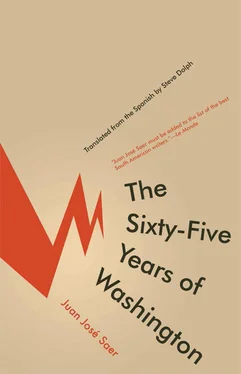Juan José Saer - The Sixty-Five Years of Washington
Здесь есть возможность читать онлайн «Juan José Saer - The Sixty-Five Years of Washington» весь текст электронной книги совершенно бесплатно (целиком полную версию без сокращений). В некоторых случаях можно слушать аудио, скачать через торрент в формате fb2 и присутствует краткое содержание. Год выпуска: 2010, Издательство: Open Letter, Жанр: Современная проза, на английском языке. Описание произведения, (предисловие) а так же отзывы посетителей доступны на портале библиотеки ЛибКат.
- Название:The Sixty-Five Years of Washington
- Автор:
- Издательство:Open Letter
- Жанр:
- Год:2010
- ISBN:нет данных
- Рейтинг книги:3 / 5. Голосов: 1
-
Избранное:Добавить в избранное
- Отзывы:
-
Ваша оценка:
- 60
- 1
- 2
- 3
- 4
- 5
The Sixty-Five Years of Washington: краткое содержание, описание и аннотация
Предлагаем к чтению аннотацию, описание, краткое содержание или предисловие (зависит от того, что написал сам автор книги «The Sixty-Five Years of Washington»). Если вы не нашли необходимую информацию о книге — напишите в комментариях, мы постараемся отыскать её.
The Sixty-Five Years of Washington — читать онлайн бесплатно полную книгу (весь текст) целиком
Ниже представлен текст книги, разбитый по страницам. Система сохранения места последней прочитанной страницы, позволяет с удобством читать онлайн бесплатно книгу «The Sixty-Five Years of Washington», без необходимости каждый раз заново искать на чём Вы остановились. Поставьте закладку, и сможете в любой момент перейти на страницу, на которой закончили чтение.
Интервал:
Закладка:
And so on. That tenuous and somewhat feverish, passing cruelty, a kind of violent courtesy directed toward Leto and intended to demonstrate his absolute difference from the character — the word could not be more apt — walking with them, does not attain its objective, strictly speaking, as they say, or at least does not attain it completely, because although Leto does not fail to notice, in the Mathematician’s contemptuous hostility, an instinctive response to the other’s pretensions, the response seems disproportionate, and the distant relative’s efforts to simulate that they are walking along in a normal conversation produces less malevolent pleasure than it does a certain compassion. To the Mathematician’s short and poorly concealed laugh, the distant relative responds with another, of similar style but less effective because of its defensiveness, intended to more or less signify: To us normal people that kind of twisted interpretation of a beautiful movie goes in one ear and out the other , but his avoidance of the Mathematician’s eyes prove that he is not what they call a well-matched adversary, and the renewed pleasantries he starts sputtering confirm this: He could swear that the Mathematician’s white moccasins are Italian. Is it true? Has he heard that his boy was champion in the youth division of the interclub tennis league? The strawberries from Coronda this year were tasteless, but the asparagus came out first rate, etc., etc. His sentences, spoken carefully and with a certain insistence on an obligatory response — like a letter certified with return receipt, you could say — seem to dissolve in the air before reaching the Mathematician, who not only doesn’t register them but, with his head turned toward Leto, actually ignores even the physical presence that speaks them. Moreover, while the other talks the Mathematician busies himself in formulating more completely, and in more explicit terms not worth squandering on his distant relative, the narrative mechanics of The Wind in Florida —thinking that there always needs to be a climax at the end, he says, more or less, is equivalent to ignoring that objectivity is incomprehensible enough for its catastrophes to occur unnoticed and end up being nothing but statistics, anonymous blips in some distribution index; besides, the coincidence between the climax and the fire belongs, it seems to him, the Mathematician, to the category of comparisons so obvious that they border on tautologies. The monologues interlace and Leto, who out of courtesy and curiosity tries to listen to both at once, does not manage to concentrate on either until, aware of the competitive nature, as they say, of the situation — who will demonstrate most definitively the ineptitude of the other — grows disinterested in both. Moreover — and Leto asks himself if the distraction isn’t deliberate — the hulk of the Mathematician absorbed in his explications keeps the distant relative so far away as he walks that he, the distant relative, is only left with a thin strip of sidewalk to use, forcing him to execute a continuous slalom around the cable guardrail. And when they reach the beveled corner — or so it’s called — that widens the sidewalk, the distant relative stops talking, and taking advantage of the space, slides behind Leto and the Mathematician and, hurrying a little, beats them, as they say, to the bright section of the sidewalk, waiting for them, three meters ahead, with a triumphant expression that, far from affecting the Mathematician, on the contrary, becomes the definitive substantiation, as they say, of his proof: because just as Leto, owing to an instinctive politeness that nevertheless does not suppress the vaguely demented and, you could say, exclusively intrafamilial nature of the tacit altercation in which he doesn’t feel implicated whatsoever — like the foreign tourists indifferent to the so-called domestic struggles of the countries they visit — just as Leto, owing to an instinctive politeness, as we were saying, or rather yours truly was saying, is about to move toward the distant relative who’s waiting for them with a satisfied look in the middle of the sidewalk, the Mathematician, grabbing him by the arm with a hand whose years of rugby and crew have endowed it with what they call above average strength, detains and forces him to continue straight while the right hand lifts and drops quickly for a brief goodbye accompanied by an inaudible grunt that — Leto guesses without seeing, or just barely seeing — rearranges the distant relative’s triumphant smile into a stupefied, outraged grimace as they step over the guardrail into the street and begin to cross the bright and all but empty intersection.
— He’s a venomous snake, the Mathematician whispers as they cross, without letting go of his arm. He’s a regular at the intelligence services and the eleven o’clock mass.
Leto discharges a thick mouthful of smoke and starts to laugh, thankful. He, until the year before, went to mass every so often and more and more infrequently, and though he has stopped going without much reservation, for someone to place the eleven o’clock mass among the fundamental credentials of human iniquity serves to confirm, a posteriori , the just nature of his defection. But also, and above all, he feels thankful because he has sensed, in the Mathematician’s somewhat brutal contempt for his distant relative, a gesture of seduction toward himself, which, being unexpected and fleeting, is therefore all the more intense. The dispersed and scattered elements suddenly come together as they cross, through the unmistakable gesture of affection, and the inconstant, fragmentary flickers emerging from the dark depths inside him, where their flashes almost immediately extinguish the tenuous and phosphorescent glow of consciousness, the frayed, mercurial recollections that assault him whenever they like, the tide of regrets, the turns of phrase, the nonsense, the doubts and ghosts, the lonely flux produced by the unaccomplished all come together, as we were saying, or rather yours truly, just now, was saying, and become a solid burst, a translucent, stable whole, almost a real but fragile object, like a smoke ring or a soap bubble, that occupies every corner of his body and radiates a euphoric sense of himself, him—Ángel Leto, no? — clearly defined and distilled among the things that, dispersed across the benign transparency, fill the morning. The force of that feeling is so strong that it suppresses its sporadic or transitory character, and when they reach the opposite sidewalk, as they step over the cable, the somewhat pedantic tone with which the Mathematician, recovering from his intrafamilial vexations, resumes his story, begins to gnaw at the edges of its short-lived stability: As I was saying, with that response he assumed the conversation was finished , says the Mathematician.
— Of course, Leto says. Obviously.
— Washington’s reason for bringing up the mosquitos is explained in his response to Héctor, don’t you think? says the Mathematician, letting go of his arm after seeing the empty pipe in his hand and putting it into his pants pocket, then taking the folded up sheets of the Student Association’s press release from his other pocket to verify that they are still there and putting them away again.
Leto takes advantage of the Mathematician’s distraction to offer, without much enthusiasm, an affirmative response. What makes the whole thing troublesome, as they say, is that he can’t remember just what the pivotal response from Washington had been that, according to the Mathematician, clarified the notorious subject which a while ago, despite their contradicting moods and versions, Tomatis and the Mathematician, without even suspecting his somewhat obfuscated confusion, seemed so in agreement on. However much he tries, Washington’s response does not make what you might call an appearance in his memory — his memory, no? — or rather that maybe slightly concave mirror (or flat, what’s the difference) where certain familiar images, through which the whole universe takes on continuity, are reflected, sometimes clearly and sometimes darkly, in an uncontrollable, fugitive rhythm all their own. And Leto realizes after a moment of frustrated effort, so to speak, that the famous response, the final explication of that string of allusions which from that night toward the end of winter would travel by means of increasingly variable and dubious recollections, that Washington’s circuitous, vernacular sentence, apparently the solution to the riddle, must have been pronounced by the Mathematician, whose source was Botón, when he wasn’t listening, most likely when they were crossing the last street, just before he — Leto, no? — absorbed in his thoughts, stumbled over the cable.
Читать дальшеИнтервал:
Закладка:
Похожие книги на «The Sixty-Five Years of Washington»
Представляем Вашему вниманию похожие книги на «The Sixty-Five Years of Washington» списком для выбора. Мы отобрали схожую по названию и смыслу литературу в надежде предоставить читателям больше вариантов отыскать новые, интересные, ещё непрочитанные произведения.
Обсуждение, отзывы о книге «The Sixty-Five Years of Washington» и просто собственные мнения читателей. Оставьте ваши комментарии, напишите, что Вы думаете о произведении, его смысле или главных героях. Укажите что конкретно понравилось, а что нет, и почему Вы так считаете.












